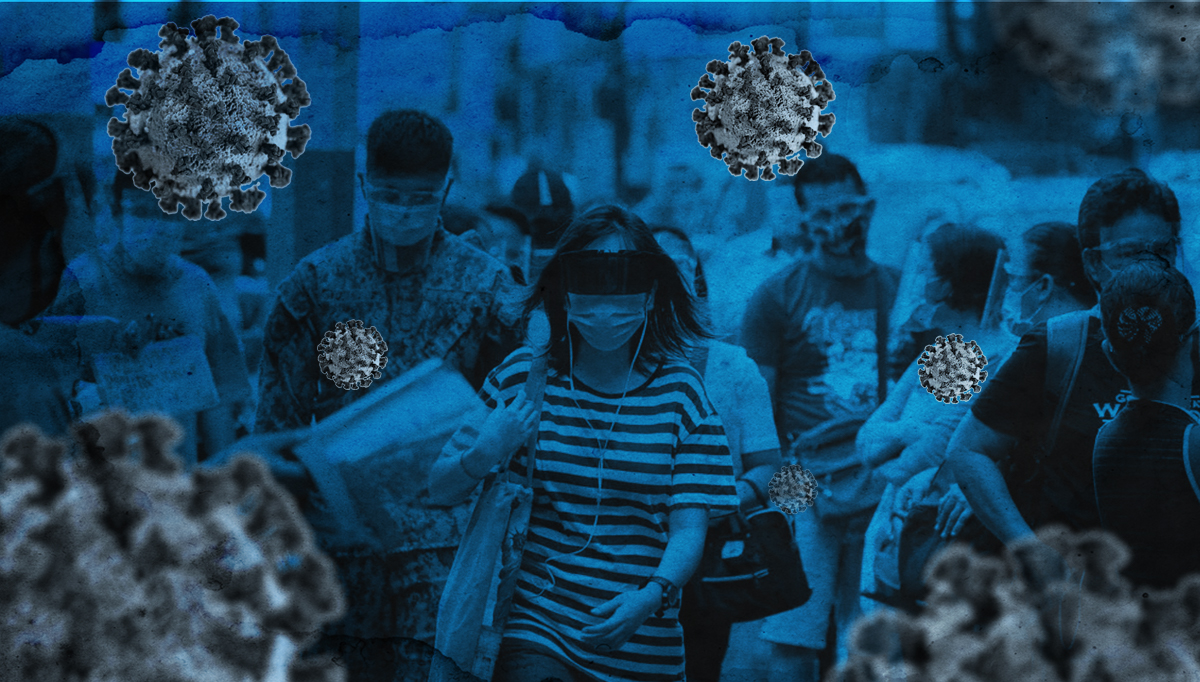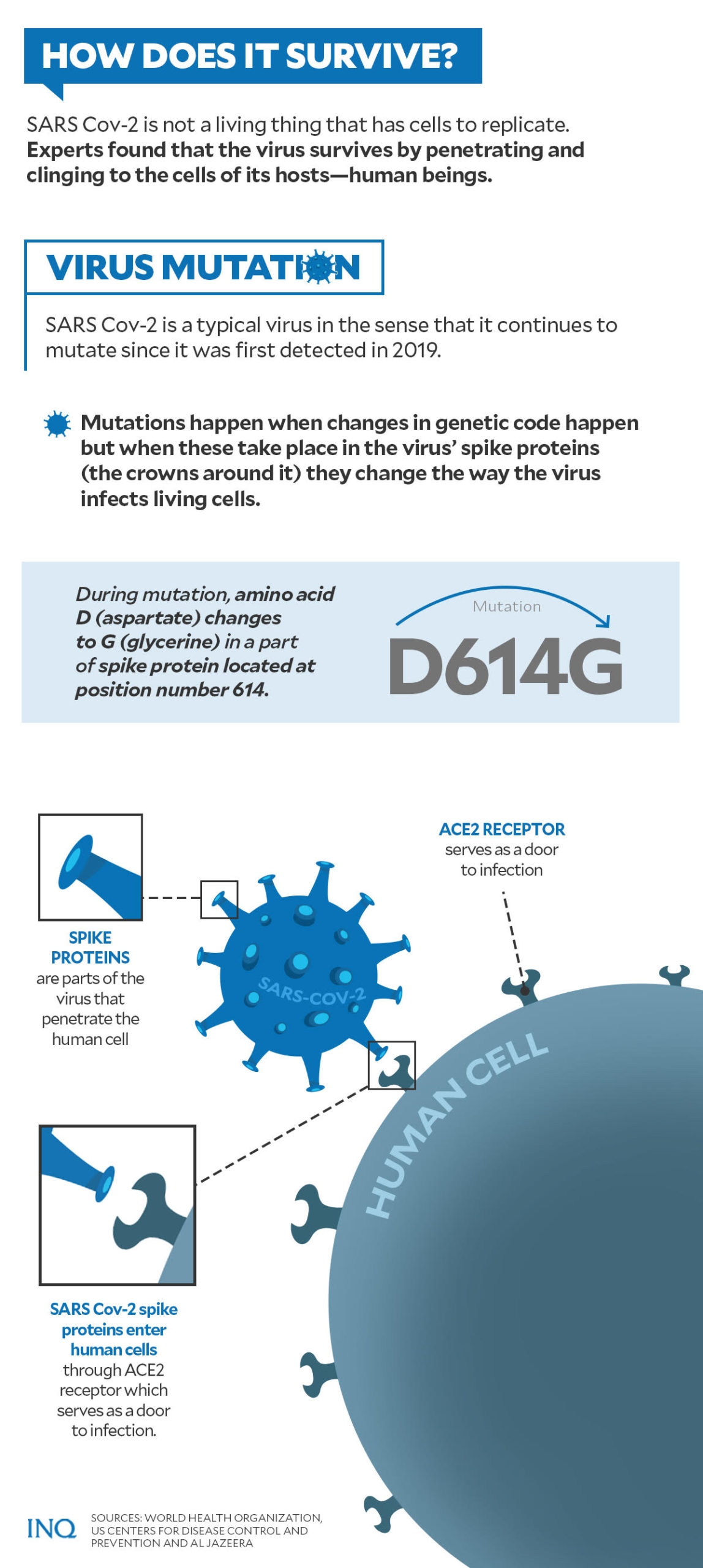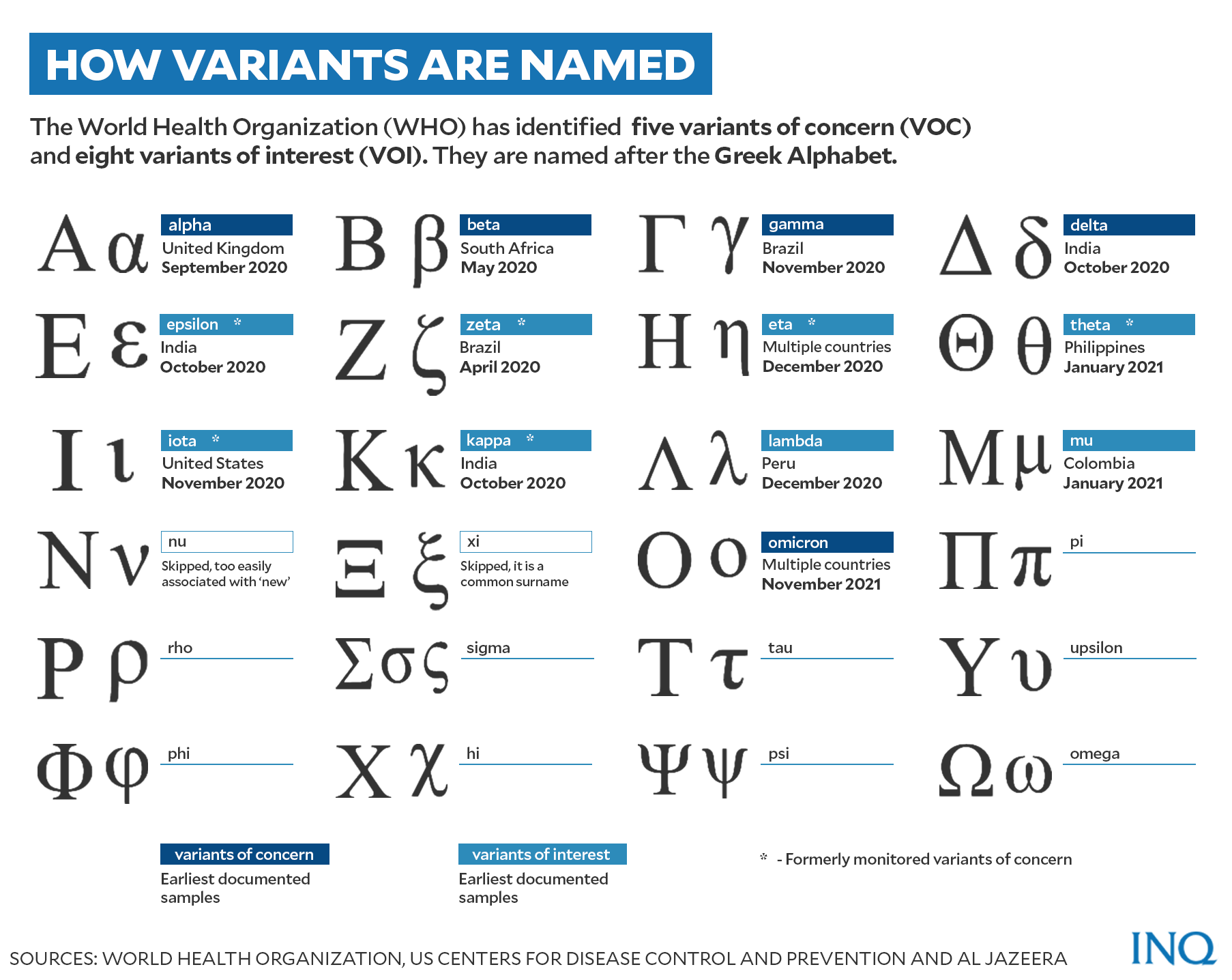The uncertainty of treating Omicron as sign of pandemic end game
MANILA, Philippines—The Omicron (B.1.1.529) variant has spread like wildfire since it was first detected in November last year and has so far reached countries and territories worldwide.
Despite the high transmissibility of the variant, some experts—including the World Health Organization (WHO)—had issued statements saying that the variant could signal the beginning of the end of the COVID-19 pandemic.
READ: Omicron: What science knows so far about latest Greek-lettered COVID variant
These statements were rooted in different factors, including the idea that the variant could apparently provide “natural immunity,” the variant being less severe than other variants, or that Omicron—after sweeping across the globe—could help bring down COVID-19 cases.
However, some scientists—as well as the WHO itself—have warned that the Omicron variant might not yet herald the current pandemic’s “end game” and that it was dangerous to assume such scenarios.
In this article, INQUIRER.net will try to weigh in on experts’ and scientists’ views on whether the Omicron variant could mark the end of the current global health pandemic caused by SARS-CoV-2, the virus that causes COVID-19.
A ‘dangerous’ assumption
Last week, Dr. Hans Henri Kluge, WHO Regional Director for Europe, said that the Omicron variant has driven the COVID-19 pandemic into a new phase and it could signal the end of the pandemic in Europe.
“It’s plausible that the region is moving towards a kind of pandemic end game,” Kluge said in an interview with Agence France-Presse (AFP).
Kluge added that once Omicron cases subside across Europe, “there will be for quite some weeks and months a global immunity, either thanks to the vaccine or because people have immunity due to the infection, and also lowering seasonality.”
“So we anticipate that there will be a period of quiet before COVID-19 may come back towards the end of the year, but not necessarily the pandemic coming back,” Kluge said.
READ: Europe could be headed for pandemic ‘endgame’– WHO
On Jan. 6, OCTA Research fellow Fr. Nicanor Austriaco aired a similar sentiment.
Citing a study, the Filipino-American priest, who is also a molecular biologist, said that the highly transmissible variant is a “natural vaccine.”
Adriatico explained that COVID-19 survivors, who had the Omicron variant, could get antibodies that will protect them “not only against Omicron but against Delta, Gamma, Beta, Alpha, and D614G” variants.
“We have to realize that Omicron is the beginning of the end of the pandemic because Omicron is going to provide the kind of population immunity that should stabilize our societies and should allow us to reopen,” he said.
Still, he reminded the public to be cautious, particularly those still unvaccinated against COVID-19.
READ: Omicron ‘the beginning of the end of the pandemic’, but public has to remain careful – OCTA fellow
Misinformation spreading on social media led to beliefs that Omicron works like a vaccine and was a way to develop immunity against the COVID virus.
But Dr. Edsel Salvana, a member of the DOH Technical Advisory Group (TAG) and director of the Institute of Molecular Biology and Biotechnology at the National Institutes of Health at the University of the Philippines-Manila, has clarified that the Omicron variant is a virus, not a vaccine.
“The Omicron is a virus, not a vaccine. Unlike vaccines that are very safe and cannot cause the infection of others, the Omicron variant can cause heavy damage,” he said.
READ: Health experts counter OCTA fellow: ‘Omicron is a virus, not a vaccine’
WHO’s director-general, Dr. Tedros Adhanom Ghebreyesus, has recently warned the public against making assumptions that the Omicron variant could lead to a pandemic end game.
“It’s dangerous to assume that Omicron will be the last variant and that we are in the end game,” Ghebreyesus said in a WHO executive board meeting.
“The COVID-19 pandemic is now entering its third year and we are at a critical juncture. We must work together to bring the acute phase of this pandemic to an end. We cannot let it continue to drag on, lurching between panic and neglect,” he said in a separate news conference last month.
“This pandemic is nowhere near over and with the incredible growth of Omicron globally, new variants are likely to emerge, which is why tracking and assessment remain critical,” he added.
READ: WHO warns: Do not assume COVID pandemic reaching ‘end game’
Meanwhile, scientists and experts said in an article published in Nature—a peer-reviewed science journal—that the Omicron’s rapid spread, paired with the “different vaccine strategies and varying levels of immunity worldwide” makes it difficult to model and map out the pandemic’s future.
‘Natural immunity’
Last month, a study showed that during the last surge of COVID cases due to the Delta variant in the United States, unvaccinated COVID survivors were better protected than those who were vaccinated and not previously infected.
The authors of the study, however, warned against depending on infection for protection, considering the higher risks to unvaccinated persons, who were not previously infected, of hospitalization, long-term impact, and death.
The finding has been added to the discussion on the relative strengths of natural versus vaccine-acquired immunity against COVID.
READ: Natural immunity more potent than vaccines during US Delta wave—study
According to Dr. Anna Ong-Lim, chief of the Infectious and Tropical Disease of the Pediatrics Department at the University of the Philippines and also a member of DOH-TAG, Austriaco’s previous statement might be based on the said study.
However, she explained that there is no definite proof yet that the Omicron variant can provide antibodies against other SARS-CoV-2 variants of concern.
The study, however, has caused confusion among many and has caused some people to think that voluntarily exposing themselves to SARS-CoV-2 could help them gain natural immunity against the disease, which still has no known cure.
“It could be fine if your breakthrough infection is mild to maybe moderate because you will have a boosted immunity, but if that will be a severe disease, that is not good,” Vaccine Expert Panel (VEP) chair Dr. Nina Gloriani warned the public.
“So we should not voluntarily get ourselves infected. That should not happen,” she said.
“I don’t think the doctors will say that you should get yourselves exposed to the virus so you can get natural immunity. If you will get exposed, it should happen naturally and not deliberately,” according to Gloriani.
“We don’t want a deliberate infection because you don’t know what may happen to you,” she added.
READ: Natural immunity more potent than vaccines during US Delta wave—study
Health reform advocate Dr. Tony Leachon likened the act of deliberately contracting the disease to rolling a dice—you never know the outcome or what you will get from it.
READ: COVID’s other debilitating impact: Whole families lose income
Dr. Anthony Fauci, US President Joe Biden’s top medical adviser for COVID-19, has expressed uncertainty on the matter.
“[I]t is an open question as to whether or not Omicron is going to be the live virus vaccination that everyone is hoping for because you have such a great deal of variability with new variants emerging,” Fauci said at the online World Economic Forum on Jan. 17.
“I would hope that that’s the case, but that would only be the case if we don’t get another variant that eludes the immune response,” he added.
Variant remains lethal, highly transmissive
Despite increasing information that getting sick with the Omicron variant is less severe than that from other variants, like Delta, scientists and experts clarified that the variant remains highly transmissive and harmful—and lethal in some cases.
“What we are learning is that people with underlying conditions, people with advanced age, people who are unvaccinated can have a severe form of COVID-19 following infection from Omicron,” said Dr. Maria Van Kerkhove, the WHO’s Covid-19 technical lead.
“And so we know that people are still being hospitalized with this variant of concern, Omicron, as well as dying,” Kerkhove continued
“So, it is important that we have information that is out there that is accurate, that does suggest, of course, that it is less severe than Delta, but that does not mean that it is mild,” she added.
READ: Omicron variant is ‘still a killer,’ says OCTA fellow
Moreover, scientists across the globe were alarmed by the rising number of cases caused by the emerging Omicron subvariant BA.2—also known as the “stealth Omicron.”
According to computational virologist Trevor Bedford’s analysis of sequencing data from the GISAID database and the case counts from the Our World in Data project at the University of Oxford, the BA.2 subvariant accounts for roughly 82 percent of cases in Denmark, 9 percent in the United Kingdom, and 8 percent in the United States.
In the Philippines, a joint statement by the Department of Health (DOH), University of the Philippines-Philippine Genome Center (UP-PGC), and the University of the Philippines-National Institutes of Health (UP-NIH) on Jan. 27 said that the sublineage had already been detected in the country.
“Both the original Omicron lineage, B.1.1.529, and its sub-lineages, BA.1 and BA.2, have been detected in the country. The earliest detection of the BA.2 sub-lineage was on December 31, 2021, and was found to be the majority of Omicron cases in the latest batch.”
Data from DOH, UP-PGC, and UP-NIH showed that the BA.2 sub-lineage was found “to be the majority of Omicron cases” in the latest batch of cases sequenced, which yielded 618 confirmed Omicron cases out of 677 samples sequenced.
The total Omicron cases in the country, as of Jan. 27, was 1,153, with five deaths due to the variant.
READ: DOH reports 618 Omicron cases; stealth sub-lineage found as early as Dec. 31
However, the DOH, UP-PGC, and UP-NIH assured that “there is no significant difference in BA.1 and BA.2 characteristics in terms of transmissibility or severity of the disease.”
Still, Andrea Ciaranello, an associate professor of medicine at Harvard Medical School and director of Massachusetts General Hospital’s perinatal infectious disease program, reminded the public to maintain preventive measures against the COVID virus and its variants.
“I really am encouraging people to just hang onto these mitigation measures like masking and distancing for even just a few more weeks,” Ciaranello told the Harvard Gazette, the official news website for Harvard University.
“It really could be life-saving for people who just cannot find a good vaccine response.”
The virus is ‘still evolving’
Aside from preventing more people from getting infected due to the risk of developing severe disease, among many other factors, scientists and experts explained that high transmissions may translate to more mutations.
“We just want to tell the public that we should understand the situation. The higher the infections, the higher the chance of the virus to replicate—which is their cycle—and they can reproduce,” said Health Undersecretary and spokesperson Maria Rosario Vergeire.
“And the most important part is there will be higher chances for the virus to mutate. We need to prevent this high number of infections so that we will not have further mutations which can lead to more fatal outcomes,” she added.
This was echoed by David Ho, professor of microbiology and immunology at Columbia University, who said there is no guarantee yet that a new version of COVID-19 would be more benign than its predecessors.
“SARS-CoV-2 has surprised us in many different ways over the past two years, and we have no way of predicting the evolutionary trajectory of this virus,” Ho said.
READ: EXPLAINER: Why you should still try to avoid catching Omicron
Both statements likewise support previous statements from different experts that the Omicron variant, which was believed by some could lead to the end of the pandemic, will not be the last COVID virus variant.
“[Omicron] will not be the last variant, and so the next variant will have its own characteristics,” said Graham Medley, an infectious-diseases modeler at the London School of Hygiene & Tropical Medicine, who advises the UK.
“We’re hearing a lot of people suggest that Omicron is the last variant, that it’s over after this. And that is not the case because this virus is circulating at a very intense level around the world,” Kerkhove said.
Going back on the question of whether the Omicron variant will truly bring the world to the pandemic’s end game, here was Jacob Lemieux’s answer.
“I don’t think we’re out of the woods yet. I do think things will get better,” he said.
“But we’re going to have to keep a really close eye on the evolution of this virus because that has continued to be a major factor in the pandemic to date, and I don’t expect that to change,” he added.
Lemieux is an associate professor at Harvard Medical School, infectious disease physician at Massachusetts General Hospital, and co-lead of MassCPR’s (Massachusetts Consortium on Pathogen Readiness) variants program
TSB
RELATED STORIES: COVID as endemic disease: Not weaker but forever with us Coping with COVID: A virus that’s likely to stay
For more news about the novel coronavirus click here.
What you need to know about Coronavirus.
For more information on COVID-19, call the DOH Hotline: (02) 86517800 local 1149/1150.
The Inquirer Foundation supports our healthcare frontliners and is still accepting cash donations to be deposited at Banco de Oro (BDO) current account #007960018860 or donate through PayMaya using this link.



